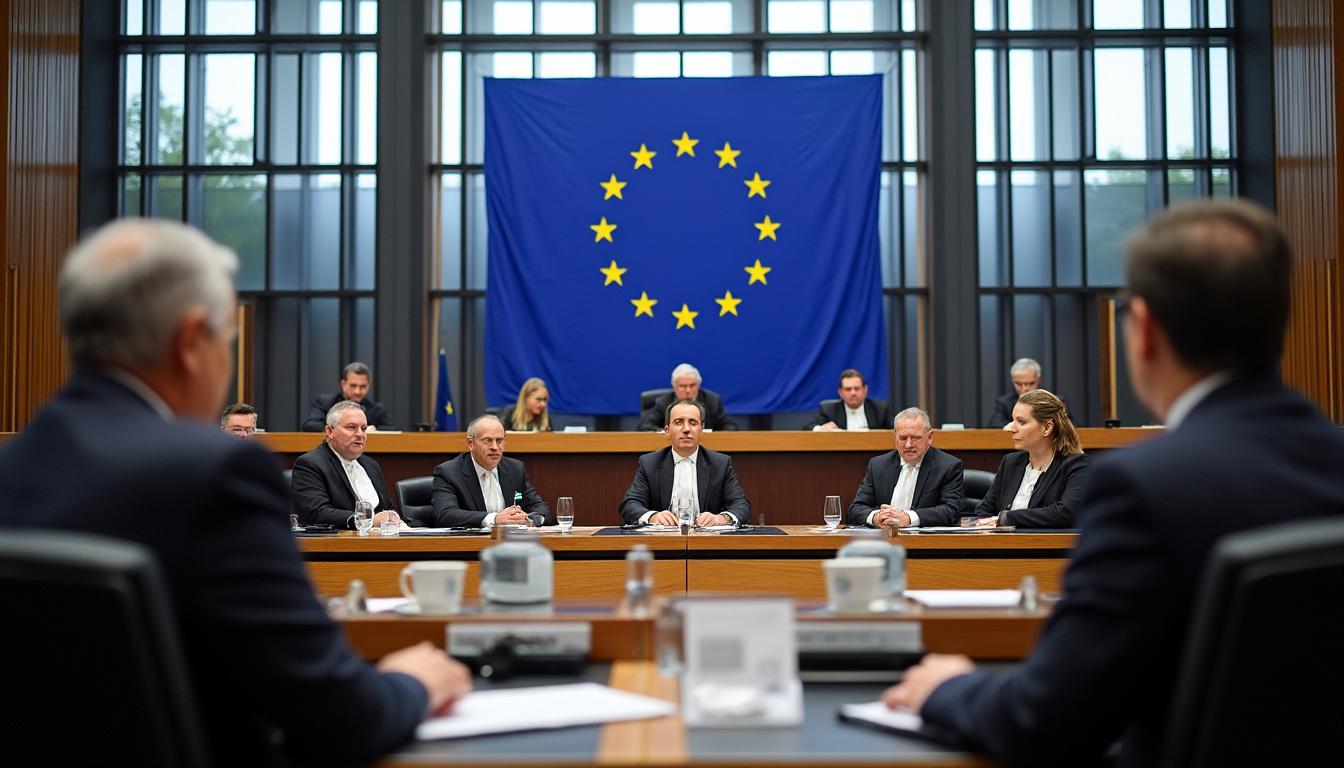The General Court recently proceeded to examine the initial arguments presented by Booking Holdings following the European Commission’s decision to block its acquisition of Etraveli. This dispute underlines the complexities of merger regulations within the European Union, particularly amidst the evolving landscape of online travel services. The implications of this case could resonate deeply across various stakeholders in the travel industry.
Understanding the Background of the Booking and Etraveli Case
In October 2022, the European Commission received a notification regarding Booking’s intent to acquire Etraveli, a significant player in the online travel sector, specifically in flight bookings. This proposal aimed at consolidating operations and enhancing service offerings between two key market entities. However, the Commission raised concerns about potential anti-competitive effects, leading to the unprecedented decision to block the merger.
Booking Holdings, which operates Booking.com, claimed that the Commission unfairly dismissed its arguments, alleging that the regulatory body deviated from its established non-horizontal merger guidelines. The merger was projected to create a more comprehensive offering, combining Etraveli’s flight services with Booking’s extensive hotel booking capabilities. This could enhance consumer choice and drive competitive prices in the tightly regulated European marketplace.
Key Arguments Presented by Booking Holdings
During the initial hearings, Booking Holdings articulated several central arguments in support of its appeal. Among these, the company stressed the following points:
- Consumer Benefits: Booking argued that the merger would ultimately provide consumers with better access to travel options, allowing for an integrated user experience across lodging and flight bookings.
- Market Dynamics: The online travel agency (OTA) sector is characterized by fierce competition, primarily driven by platforms like Expedia, Kayak, and Trivago. Booking claimed that combining resources with Etraveli would not diminish competition but fortify it against larger competitors.
- Regulatory Precedents: In contrast to the Commission’s conclusions, Booking highlighted instances where preceding non-horizontal mergers were permitted, pointing to a pattern of treatment that it believed was inconsistently applied.
This appeal is expected to set a precedent for future merger evaluations in the EU, particularly in how digital platforms are regulated. The scrutiny of the merger’s impact on the market ecosystem reflects growing concerns regarding monopoly practices in tech-driven industries.

The Implications of the General Court’s Ruling
The ongoing appeal by Booking Holdings against the Commission’s prohibition has broader implications not only for the parties involved but also for the future of non-horizontal merger assessments within the EU. Should the General Court rule in favor of Booking, it could signal a significant shift in how mergers are evaluated, especially in digital industries where innovation and competitiveness are critical.
A favorable ruling for Booking could potentially stimulate increased merger activity within the travel sector. If companies perceive an opportunity to consolidate without facing stringent regulatory barriers, it may lead to a wave of mergers and acquisitions. Furthermore, this could encourage smaller companies or startups in the travel technology space to pursue growth through partnerships and acquisitions as a viable strategy.
Potential Changes in Regulatory Approach
If the General Court validates the points raised by Booking, the European Commission may be compelled to reconsider its approach to assessing future merger cases. This could introduce a more nuanced understanding of how digital ecosystems function, reshaping regulatory frameworks. Potential alterations may involve:
- Dynamic Market Analysis: Acknowledging the fluid nature of digital markets, regulators may need to implement more dynamic criteria for assessing competition and consumer impact.
- Innovative Solutions: As digital platforms evolve, the regulatory body would benefit from embracing innovative solutions that might better protect consumer interests without stifling competitiveness.
- Stakeholder Engagement: Increasing engagement with industry stakeholders could foster a more effective dialogue regarding the implications of mergers on consumer welfare and market competition.
Conversely, should the court uphold the Commission’s decision, it would send a strong message about the seriousness of regulatory oversight in maintaining competition in the market. It could also embolden the Commission to further scrutinize future mergers more rigorously, particularly in sectors dominated by leading players.
The Role of Competition in the Travel Industry
The essence of this appeal underscores the ongoing battles between major players in the travel industry, where competition is critical in dictating consumer choices and pricing. A competitive landscape is vital for ensuring that consumers benefit from a variety of options, quality services, and reasonable prices. Booking’s appeal against the EU’s prohibition highlights the ongoing tension between corporate ambitions and regulatory frameworks that seek to maintain healthy market competition.
Regulators are tasked with balancing the need for competitive markets with the inevitability of mergers in enabling companies to adapt to evolving consumer demands and technological advancements. This situation is particularly relevant in the travel industry, where new technology and service models frequently disrupt established dynamics.
Impact of Major OTAs on Competition
Travel agencies, including notable players such as Expedia, Priceline, and Orbitz, continue to influence the marketplace significantly. The clustering of services by major OTAs often leads to improved prices for consumers; however, it also raises questions about the extent of market control that these platforms exert. The competitive landscape is heavily influenced by several factors:
- Price Comparison Tools: Platforms like Kayak and Trivago enable consumers to easily compare prices, creating a competitive atmosphere where OTAs must adjust their rates accordingly.
- Customer Features: Many companies, including Hotels.com and Agoda, are implementing loyalty programs, reviews, and individualized offerings to capture consumer attention.
- Technological Integration: With advancements in artificial intelligence, OTAs are leveraging technology to improve customer service and create personalized experiences, showcasing the necessity for competitive innovation.
The interplay of these factors illustrates the continual evolution of travel services, accentuating how mergers may affect progress and competitiveness in the sector. With consumers becoming progressively more discerning, the ability of OTAs to adapt will be a crucial determinant in their future success.

Consumer Perspectives and Market Dynamics
Consumer sentiment plays a pivotal role in shaping the travel sector. The Booking and Etraveli case is not merely a corporate dispute; it reflects broader societal interests toward consumer rights in an age where options and cost-effectiveness are paramount. Understanding these perspectives is essential for dissecting the implications of the appeal.
As evidenced by the evolving preferences seen in post-pandemic travel trends, consumers are increasingly seeking platforms that offer seamless integrations between travel services. Many people utilize multiple OTAs during their planning phases, navigating between services to ensure they achieve the best price combined with favorable terms. This behavior results in a more pronounced opportunity for companies providing comprehensive solutions.
Consumer Behavior and the Growing Demand for Integration
The appeal of integrated travel services is evident as consumers strive for efficiency in their travel planning. The following trends are notable in consumer behavior:
- Price Sensitivity: Users search for the best deals, often comparing services across various platforms before making a decision.
- Multi-Platform Engagement: Consumers frequently change between OTAs like Booking.com, Hotels.com, and Expedia to analyze differences in prices and offers.
- Convenience Expectations: The demand for user-friendly interfaces and easy booking processes has risen, prompting OTAs to adapt their services accordingly.
As the travel service ecosystem morphs, companies that can address consumer demands for integration and convenience will likely emerge as winners. The court’s ultimate decision in the Booking and Etraveli case could serve as a benchmark for understanding how future mergers might align or misalign with these evolving consumer needs.
Looking Ahead: The Future of Travel Mergers
The ongoing legal debate surrounding Booking’s acquisition of Etraveli emphasizes essential dialogues regarding the future of mergers and acquisitions in the travel sector. Various outcomes are possible, each carrying distinct implications for how digital platforms will be regulated and how competition will be fostered in a rapidly changing landscape.
A court ruling favoring the merger could pave the way for a surge of consolidation in this sector, reflecting the necessity for companies to innovate and streamline operations in the face of increasing competition. Alternatively, an upholding of the Commission’s decision might discourage such moves, reinforcing a cautious approach among emerging businesses.
Key Takeaways for Stakeholders in the Travel Industry
Each participant in the travel sector must closely monitor the ongoing developments of this case, as the implications could significantly influence market dynamics. Stakeholders should consider the following:
- Strategic Planning: Firms must prepare for regulatory changes and adapt their strategies accordingly to remain competitive.
- Stay Informed: Keeping track of updates regarding this case and similar regulatory developments is paramount for making informed business decisions.
- Consumer Engagement: Actively engaging with consumers to understand their needs can provide insights that drive innovation and service improvement.
The road ahead for the travel industry is indeed complex, yet filled with opportunities for those who can navigate the regulatory landscape and remain attuned to consumer demands.
